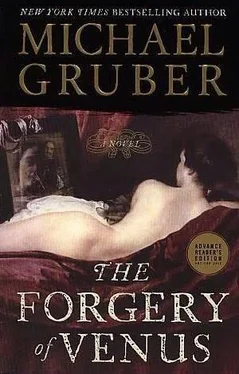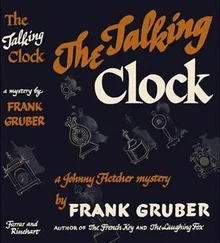Which I didn’t, no, I got drunk instead, a half bottle of bourbon, and passed out in the downstairs bathroom in a pool of puke, charming, and he found me there and cleaned me up. What was he trying to prove? That in the end he loves me more than she does, that he won the war of the Wilmots? Anyway, he wrote me out a check for five grand the next morning, and we talked about what I had to see and we sat there in his studio and talked about it, about the museums, London, Paris, Madrid, Rome, Florence, the same trip we did together when I was nine, when I got to look at the European collections for the first time.
That first time with Dad we stayed at the Ritz-God, he could throw money around in his flush years-everyone was real nice to me there, and I thought it was because I was such a terrific kid before Charlotte set me straight, incredible embarrassment, though I never admitted it to her. She hated that part, and now that I think about it I guess it was then she started visiting churches and convents, insisted on going up to Ávila to see St. Teresa.
When I made the European trip by myself in my twenty-first year, I skipped the Ritz and stayed at a one-star albergo three flights up on Calle de Amor de Dios at the corner of Santa Maria, an address Charlie would no doubt approve of and about a ten-minute walk to the Prado. I hadn’t been to the place since I was nine, but it seemed like I just stepped out for a minute, the pictures all in the same place. But my eye had been polluted with art history courses, and I knew that I’d never recapture that fucking explosion when I first saw it, because it was one of Dad’s ploys never to have art reproductions in the house, no coffee-table books spoiling the golden eye of young Chaz. My father took me into the big room through the back way, through the dreary mediocrities of the later seventeenth and eighteenth centuries, fussy brown paintings, and then Room Sixteen and there’s the Surrender of Breda, the first big Velázquez I ever saw. I wanted to spend my life looking at it, that Dutch soldier glancing casually out of the picture plane-how did he even think of doing that-and the lances the way they were, just perfect, but he wouldn’t let me stay, he grabbed my arm and pushed me past the famous portraits and the prophets in the desert with that wonderful black bird suspended in real air and through the grand room, the center of the cult, Room Twelve, and we hung a sharp right and there was Las Meninas .
The school of painting, Manet called it, and my father’s opinion was that taken all in all, it really was the best thing anyone had ever done in oils. He told me, and I can believe it, that when I first stood in front of it my mouth dropped open and I held my hands up to my cheeks, like a version of Munch’s The Scream. It was so wonderful at first sight, like the Grand Canyon or the Statue of Liberty, but more so, because I had been hearing about it for my whole life and I’d never even seen a postcard of it. And so I stood there trying not to disgrace myself by crying while he talked.
Nine-year-olds are not supposed to have that kind of reaction to paintings, but I suppose I was a kind of twisted prodigy. Can I even remember what he said? Maybe it’s been layered over in my mind by all the formal art criticism I got in college. There wasn’t much historical material, just a working painter’s admiration for a genius. He made me look at the light coming in through the window on the right, the way that light shines on the painted wood of the window frame. Vermeer made a whole career out of light shining on painted surfaces, he said, and never did anything better than that, and Velázquez just tossed it in as something extra.
And the playing with visual reality in a way that wouldn’t appear again in Western art until the mid-nineteenth century. In fact, he said, Manet got all that business of flat tonality and bold clean outlines from this painting, and there wouldn’t be anything like the blurred treatment of the lady dwarf until the twentieth, it was like something out of de Kooning or Francis Bacon.
And the perfect, doomed little girl at the center, the most important little girl in the whole world, the heartbreaking look of pride and terror on her face, and the two attendant meninas, one superbly painted like her mistress, the other blocked in angular planes like a wooden doll, a little Cézanne avant le lettre (why? He didn’t know, a mystery) and the whispering nun and the waiting figure in a glory of yellow in the far doorway (terrifying! Who knew why?) and the unimportant king and queen in the dusty mirror, and every movement and gesture in the whole vast thing directing the eye to the guy with the mustache and the black tunic with the cross of a knightly order on it, standing calmly in the midst of it with his palette and brushes. He’s saying I made this all, my father told me, he’s saying I have stolen this moment from time, this is how God sees the world, each instant an eternity, and when the dwarfs and the dog and the nun and the courtiers and the royal family and their maids are forgotten dust, this will live and live forever, and I, Velázquez, have done this.
Irecall the expression on his face as he said it, and I guess I thought he was talking about himself, because at nine I thought my father was in the same class as Velázquez, the greatest painter in the world. No, not really true; I think after that trip to Europe, after really seeing the masters, even at nine I could tell the difference, and I think he could see that I could. Over the next year it made him increasingly cranky, more demanding, more authoritarian. He was the master; I was the student and always would be. But the fact is I’m better than he was, maybe not as far above him as Velázquez was above his own master, Pacheco, but a discernible gap. Not that I could actually say that or claim that, even to myself, and I wonder how Velázquez handled it. Of course Pacheco wasn’t his father, just his father-in-law, but still.
All that crap came flooding back when I stood in front of Las Meninas for the second time and I realized that’s what I’ve always wanted from art, the ability to stand apart from the domestic whatever, the whispers, the favorites, the little cruelties.
And, my friend, you’ll see that, in a strange and unexpected way, I have succeeded. But also you may be thinking, hey, isn’t this supposed to be about the painting? Why is he giving me all this crap about his sad life? Because it’s not just about the painting. It’s about whether my memory has anything whatever to do with what really happened. Figure that out and the painting is explained one way or the other. Therefore I spread my memories before you as with a trowel. Are there inconsistencies? Impossibilities?
Pay attention, please.
The following day I met Suzanne Nore in the Prado.
I never pick up girls in museums, I can’t see them when I’m in my art head, but there she was, looking at Velázquez’s equestrian Baltasar Carlos, and I couldn’t take my eyes off her, that mass of red-gold hair down to her butt. I waited until we were alone in the room and then I just started talking like a maniac about the painting, the unbelievable mastery of technique, the paint so thin that it runs, the weave of the canvas showing through, all done in one go with practically no corrections, look at the damn background, it’s like a sumi-e painting or an aquarelle, and the texture of the costume, he taps the brush here and there and your eye reads it like gold embroidery, and look at the face, it’s practically a sketch but the whole psychology of the kid is stripped bare, and so on and so on, I couldn’t stop, and she started to laugh and said, you really know a lot about painting, and I said, yeah, I do, I’m a painter and I want to paint you. I almost said I wanted to paint you naked, but I didn’t.
Читать дальше












